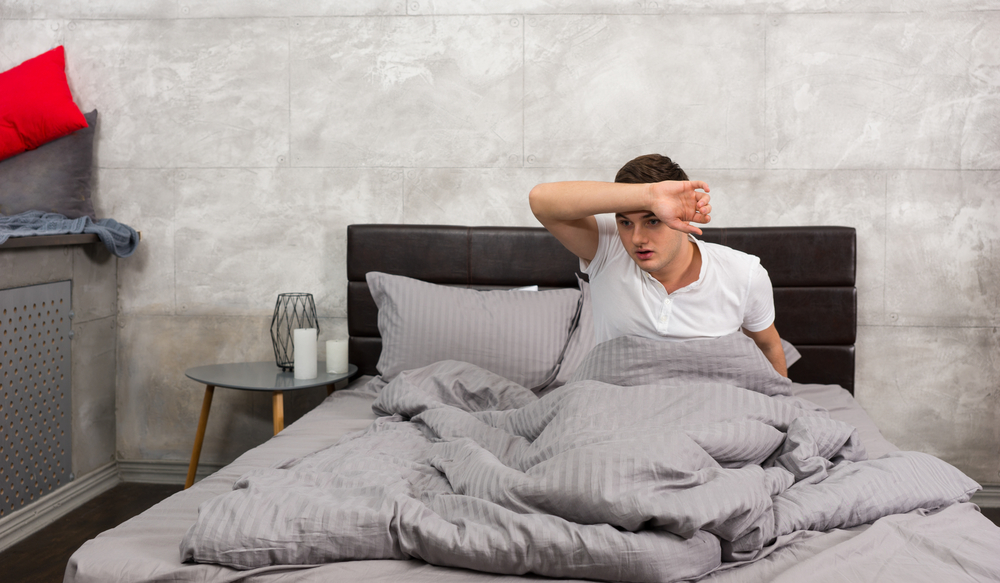Night sweats can be disruptive and uncomfortable, causing disturbances in your sleep pattern and impacting your overall well-being.

Fortunately, there are several strategies you can employ to prevent and manage night sweats, ensuring a more restful night’s sleep.
Choose Breathable Bedding
Opt for bedding materials that allow for better air circulation, such as cotton or linen.
These fabrics are breathable and help regulate body temperature, reducing the likelihood of overheating and night sweats. Here’s an example: https://orezon.co/blogs/home-decor/best-bedding-for-night-sweats-guide-to-cooling-fabrics
Use Moisture-Wicking Pajamas
Moisture-wicking fabrics, commonly used in athletic wear, draw moisture away from the body.
Wearing pajamas made from these materials can keep you dry and comfortable throughout the night, minimizing the occurrence of night sweats.
Maintain a Cool Bedroom Environment
Ensure your bedroom is kept at a comfortable temperature.
A cool room, typically between 60-67 degrees Fahrenheit (15-20 degrees Celsius), can contribute to better sleep and reduce the likelihood of night sweats.
Stay Hydrated
Dehydration can contribute to night sweats.
Drink an adequate amount of water throughout the day, but be mindful of consuming large quantities before bedtime to minimize bathroom trips that could disrupt your sleep.
Limit Caffeine and Alcohol Intake
Both caffeine and alcohol can disrupt sleep patterns and contribute to night sweats.
Limit your intake, especially in the hours leading up to bedtime, to promote a more restful night’s sleep.
Manage Stress
Stress and anxiety can trigger night sweats. Incorporate stress-reducing practices into your daily routine, such as meditation, deep breathing exercises, or yoga, to promote relaxation and better sleep.
Choose the Right Mattress and Pillows
A mattress and pillows that provide proper support and ventilation can make a significant difference in regulating body temperature.
Memory foam mattresses and pillows may retain heat, so consider options with cooling features.
Establish a Consistent Sleep Routine
Maintain a regular sleep schedule by going to bed and waking up at the same time each day.
This helps regulate your body’s internal clock, promoting better sleep and potentially reducing night sweats.
Evaluate Medications
Some medications can contribute to night sweats as a side effect.
If you suspect your medications may be the cause, consult with your healthcare provider to discuss potential alternatives or adjustments to your treatment plan.
Address Underlying Health Issues
Night sweats can be a symptom of underlying health conditions such as hormonal imbalances, infections, or sleep disorders.
If your night sweats persist, consult with a healthcare professional to identify and address any potential health issues.
Keep a Sleep Diary
Track your sleep patterns, diet, and daily activities in a sleep diary. This can help you identify patterns or triggers for night sweats, enabling you to make targeted lifestyle changes.
Investigate Hormonal Imbalances
Hormonal fluctuations, especially in women going through menopause, can contribute to night sweats. Consult with a healthcare provider to explore hormone replacement therapy or other interventions that may help manage hormonal imbalances.
Practice Good Sleep Hygiene
Establishing good sleep hygiene can contribute to better overall sleep quality and may help manage night sweats. This includes creating a bedtime routine that signals to your body that it’s time to wind down.
Avoid stimulating activities, such as using electronic devices or engaging in intense exercise, close to bedtime. Instead, opt for calming activities like reading a book or taking a warm bath to relax your body and mind before sleep.
By incorporating these tips into your routine, you can create a conducive sleep environment and reduce the frequency and severity of night sweats. If your night sweats persist or worsen, it’s essential to seek guidance from a healthcare professional to identify and address any underlying issues.
Related Posts: